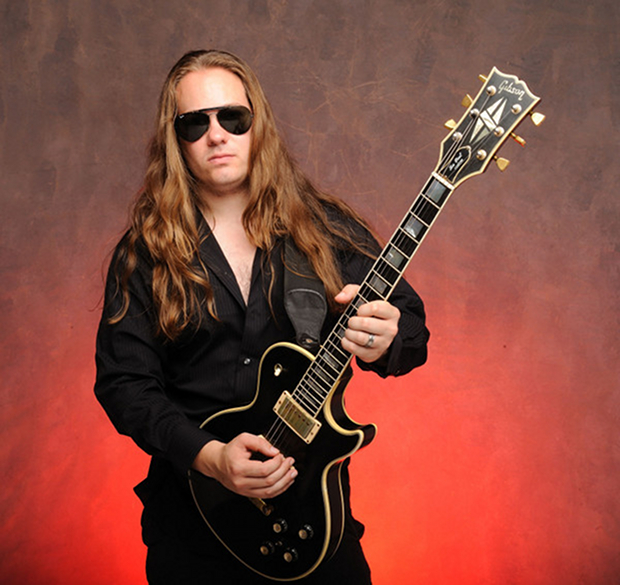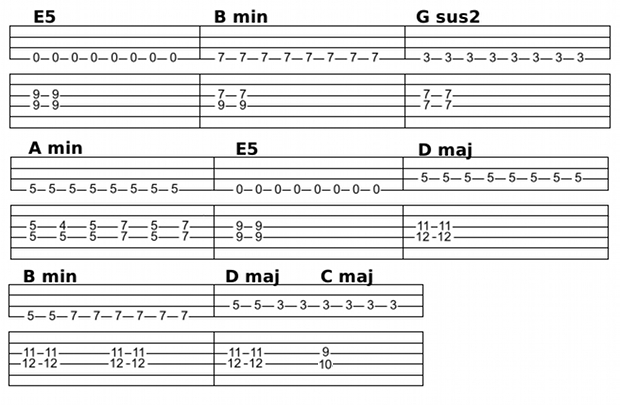Bent Out of Shape: Tips for Writing Better Guitar Riffs

As a rock/metal guitarist, I am continuously working on writing better guitar riffs. From my perspective, the guitar riff has suffered in modern music in terms of creativity and usage.
A good, creative riff is the most important ingredient when writing any rock/metal song. Here are a few tips that might help you write better riffs.
01. Don't Use Just Power Chords: My biggest pet peeve is when guitarists write riffs using solely "power chords." I've seen countless guitarists lock their first and third fingers into the power chord shape and just move up and down the neck like a mindless zombie.
This demonstrates a lack of musicianship and knowledge. I began to actively develop my riffs when I realized that a power chord is really just an interval, a 5th. Then I started to think, "Why not experiment with other intervals?" and discovered that 3rds and 4ths are very useful for writing riffs. I avoid using power chords unless I feel it is the best voicing for that particular chord.
To help you get started, here is an A minor scale played in 5th's, 4th's and 3rd's.

02. Always Write in the Context of a Full Band: When I'm writing, I think of how what I write will sound in the context of a full band. Developing my previous point, I've discovered in a full band that power chords don't necessarily produce the best sound. In studio recordings, if you double track power chords through a high-gain amp and then have the bass guitar also play the root, you can end up with a very messy sound that lacks clarity. Instead, try having the guitars play 4th's and have the bass play the root. This will give you the same chord but with a much clearer sound.
03. Bassists Don't Have to Imitate Rhythm Guitarists: I have an issue with the fact that the bass follows exactly what the rhythm guitars are playing. Again, developing my previous point, if you have double-tracked guitars and a bass that always plays exactly the same thing, why do you even need the bass? Separating the guitars and bass will allow you to experiment with dynamics previously unavailable when writing riffs.
Get The Pick Newsletter
All the latest guitar news, interviews, lessons, reviews, deals and more, direct to your inbox!
04. Use Chord Shells: When using high-gain guitar amp, big chords played across many stings will sound mushy. For this reason, I always try to outline chords using chord shells on just a couple of strings. A simple example would be, instead of playing a major or minor chord to just play a third. Using A minor as an example, the full chord would be A-C-E; but if you just play the 3rd A-C, you can still hear the minor tonality of the harmony without needing to play the 5th. You could also experiment with having the guitar play the major 3rd interval of C-E and have the bass play the route to outline the full A minor chord.
05. Try Voice Leading: As most guitarists know, you can play the same chord in many different positions on the neck. These different positions are known as voicings. The concept of voice leading is when changing from one chord to another to use the closest possible voicing to the previous chord. Using this method can help make your riffs sound more musical. To finish, I want to give you an example of one my own songs that incorporates all of my tips into one riff. This sample was mixed by Michał Kuczera.

Notice how the guitar outlines each chord using only two notes with very little movement between each chord. In bars 6 and 7, the guitar plays the same major 3rd interval (D-F#) while the bass moves from D to B to create D major to B minor.
I hope these tips give you some ideas on how to be more creative with your own riffs. Cheers!
Will Wallner is a guitarist from England now living in Los Angeles. He recently signed a solo deal with Polish record label Metal Mind Productions for the release of his debut album, which features influential musicians from hard rock and heavy metal. He also is the lead guitarist for White Wizzard (Earache Records) and in 2012 toured Japan, America and Canada. Follow Will on Facebook and Twitter.
"Upgrading from your entry-level acoustic opens the door to an entirely new world of tonewoods, body shapes, and brands": 6 signs it's time to upgrade from your first acoustic guitar
"I'm past my prime": 5 common excuses for not learning the guitar – and 5 body and mind-boosting reasons you should









